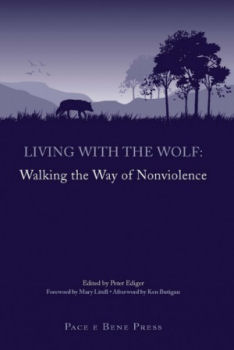
|
Posted March 23, 2010
Book: Living with the Wolf: Walking the Way of Nonviolence Edited by: Peter Ediger Pace E Bene Press. Las Vegas, NV. 2009. Pp. 113 An Excerpt from the Jacket:
An Excerpt from the Book: Hope and Nonviolence Peter Ediger Spring 1997 Hope is to nonviolence what fuel is to fire. Without hope, nonviolence dies. Indeed, the proliferation of violence in a society is a symptom of society’s loss of hope. In the quest for personal and cultural transformation from violence to wholeness, it is imperative that we drink from the well of hope. But where do we find hope in the present moment? Where are the refineries which produce the fuel of hop to fire our nonviolence? What kind of hope can we hold in the present moment? Is there a hope that does not deny the depth or scope of the realities of our time? Is there a hope that can keep us singing the Creator’s song with integrity in our time? Where shall we look for such hope? Our society invites us to find hope in our achievements, our self-confidence, and our cleverness. Is such self-affirming hope serving us well, or is it a false hope cultivating illusions, which foster a cultural arrogance? There is another voice suggesting that our hope is in acknowledging the poverty of our spirit. Our society invites us to find hope in the avoidance of pain, in the building of the comfortable life. Is such self-protecting hope serving us well, or is it a false hope building walls which offer an apparent security for a time, but in the end imprisons us in isolation from each other? There is another voice suggesting that our hope is in mourning the pain within us and around us. Our society invites us to find hope in the exercising of power and control over other people and earth’s resources. Is such self-expanding hope serving us well, or is it a false hope separating us from our sisters and brothers and our mother earth? There is another voice suggesting that our hope is in being gentle with each other on our earth. Our society invites us to find hope in the accumulating of things, the amassing of wealth, the hungering to possess. Is such self-securing hope serving us well, or is it a false hope feeding our fears of our fellow creatures on this finite planet? There is another voice suggesting that our hope is in our hungering and thirsting for justice. Our society invites us to find hope in judging harshly, in handing down severe sentences to offenders. Is such self-righteous hope for protecting ourselves serving us well, or is it a false hope blinding us to our own offences? There is another voice suggesting that our hope lies in being merciful. Our society invites us to find hope in capacity to compartmentalize our lives: our faith from work, our private self from our public faces. Is such self-multiplying hope serving us well, or is it a false hope leading to personal and public disintegration? There is another voice suggesting that our hope is in the purity of our hearts. Our society invites us to find hope in our capacity for war-making. The slogan “Peace through Strength” suggests not strength in our compassion or character but strength in the number and sophistication of our weapons of war. Is such self-arming hope serving us well, or is it a false hope destroying our souls in the destruction of our enemies? There is another voice suggesting that our hope is in being peacemakers as children of God. Our society invites us to find hope in conforming to its values, in avoiding hard questions or taking unpopular positions do what is right. Is such self-saving hope serving us well, or is it a false hope promising a comfort which leaves us restless? There is another voice suggesting that our hope lies in our willingness to suffer persecution for the sake of truth and justice. Our personal and cultural transformation from violence to wholeness begins with the transformation of the basis of our hope. Our hope comes from acknowledging the poverty of our spirit, our mourning, our gentleness, our hunger for justice, our mercy, our integrity, our peacemaking, our willingness to suffer for the right. Such hope is salt for the earth; such hope is light for the world. Table of Contents: Part One: Naming Nonviolence Part Two: Living Nonviolence Part Three: Engaging Nonviolence Our society invites us to find hope in the avoidance of pain, in the building of the comfortable life. Is such self-protecting hope serving us well, or is it a false hope building walls whch offer an apparent security for a time, but in the end imprisons us in isolation from each other? There is another voice suggesting that our hope is in mourning the pain within us and around us. |
|
